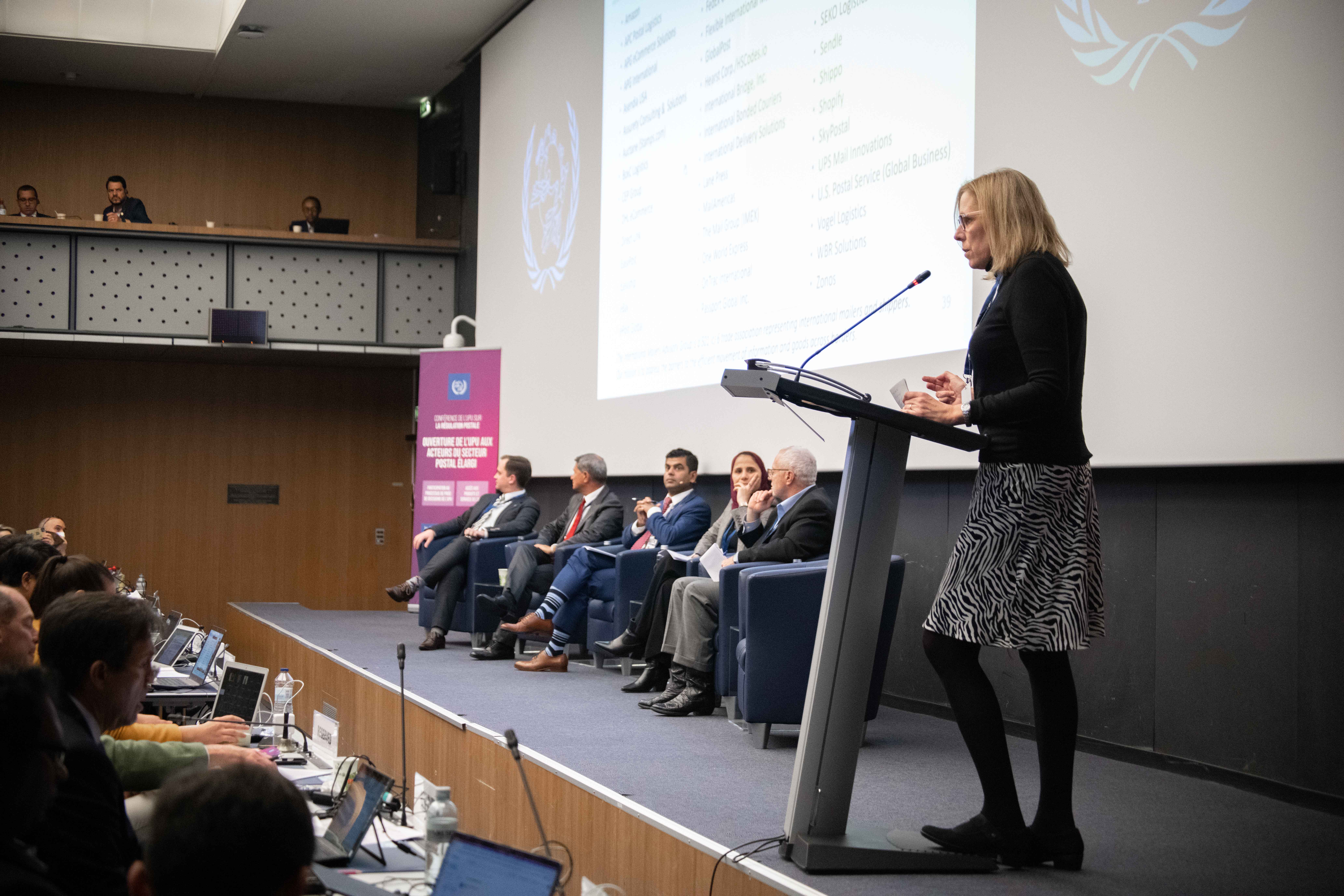The 2022 UPU Conference on Postal Regulation, held during the Council of Administration, focused on opening of the UPU to the wider postal sector – a matter to be discussed and decided upon further at the 2023 Extraordinary Congress.
UPU Director General Masahiko Metoki opened the Conference, noting that the event came at an “important juncture” of the UPU’s work on the question of opening up, a topic handled by a special Council of Administration (CA) task force which is responsible for preparing a series of proposals on further widening and deepening the UPU’s engagement with wider postal sector players (WPSPs), to be debated during next year’s Extraordinary Congress.“I wish to take this opportunity to invite top-level decision makers from governments, regulatory authorities and designated operators, as well as wider postal sector players to actively participate in the discussion,” he said.
Expanding collaboration
The first panel – moderated by task force co-chairs Stuart Smith from the United States and Samir Zouaoui from Algeria – discussed possible options for engaging WPSPs in UPU decision-making processes, assessing their current engagement and how it might be extended.
At present, WPSPs such as non-designated postal operators, supply chain partners and industry associations can lend their voice to UPU discussions via the organization’s Consultative Committee (CC) – a group that reports to the CA and appoints special rapporteurs from the wider sector to participate in both CA and Postal Operations Council committees.
CC Chair Walter Trezek noted that the Committee’s participation in the UPU’s work helped UPU members and wider postal sector players strike a better understanding of each other and had already led to fruitful cooperation. “The UPU should see the wider postal sector players as contributors,” he said.
Guzmán Acosta y Lara, National Director of Telecommunications and Audio-visual Communication Services for Uruguay’s Ministry of Industry, Energy and Mining, added, “Denying the opportunities that come from opening up is tantamount to rejecting the realities of the situation. The organization cannot standby on the side-lines as technological transformation takes place.”
Postal Operations Council Chair Jean-Paul Forceville, representing France, added that there was more work to be done in order for the designated postal operators of UPU member countries to be convinced that WPSPs should be more involved in the Union’s decision-making processes.
“You cannot compel an organization to change if it does not understand why it has to change,” he said.
However, he noted that market realities demanded change and the UPU needed to be more cognizant of the opportunities and risks of deeper engagement with WPSPs.
Safeguarding UPU’s mission
While some panellists acknowledged the value of collaboration via the CC, they raised concerns about the impacts of opening up on the burden carried by designated operators in delivering the universal service obligation. They stressed the importance of a level-playing field between designated and non-designated operators.
Mohamed Zaidi Abdul Karim, Head of the Malaysian Communications and Multimedia Commission’s Postal, Courier and E-Commerce Services Division, shared his organization’s approach to managing these concerns, explaining that it has shifted its focus to regulating for economic and social growth rather than just the universal service obligation.
He noted that the UPU could act as the “centre of gravity” for the wider sector, helping it balance transformation through collaboration and co-regulation while bearing in mind the need for universal service in order not to leave any one behind.
“The reality is that there is already coexistence of wider stakeholders in the marketplace … I think the UPU is ready to shift the centre of gravity at the next Congress,” he said.
Attractive products and services
The Conference’s second panel – moderated by co-chairs of the CA’s committee on postal policy and regulation, Rajeev Venugopal from Canada and Nermin Hassan from Egypt – reviewed how WPSPs could benefit from and contribute to the UPU’s expansive portfolio of global products and services.
Providing partners with services to bridge gaps in their networks could help Posts fund the universal service obligation, said William Lee, A/g Director for Postal Policy, Post, International Telecommunications and ACMA Branch of Australia’s Department of Infrastructure, Transport, Regional Development, Communications and the Arts.
“With every shock the postal sector comes under even more strain. If we do nothing, we risk leaving our citizens behind,” he said, adding that customers would not care about UPU’s restrictions, but they would care about access to seamless, high-quality and modern services. He cautioned that opening could not help resolve structural issues without a proper plan.
Vincenzo Aurelio, Head of Relations with International Authorities and Organizations for Poste Italiane, highlighted that Posts can leverage their proximity to customers and last-mile expertise. However, subject to guaranteeing the USO, Posts are also mandated to deliver in rural areas. WPSPs can offer better quality and are more agile as they do not have to abide by any stringent regulations. Therefore, a level playing field and reciprocity are the needed common denominators to create an integrated and synergetic scenario.
International Mailers' Advisory Group Executive Director Kate Muth and UPS Senior Vice President for Corporate Public Affairs Keith Kellison joined the panel to provide the WPSPs’ perspective. They provided concrete examples of how UPU and postal products and services could help them deliver and provide the postal network with additional income.
Muth suggested running market tests of UPU services with wider sector players, suggesting that many products derived their true value through exchanges between operators.
Kellison said he was open to giving Posts the first opportunity to partner, suggesting that they open themselves to taking risks, encouraging them to “fail fast and fail small” in order to develop forward-thinking solutions.
UPU Deputy Director General Marjan Osvald closed the Conference, calling on clear direction from member countries during the UPU’s deliberations on the matter. “We would like to make this organization stronger, better and sustainable,” he said.
Watch the full recording of the UPU Conference on Postal Regulation here.
